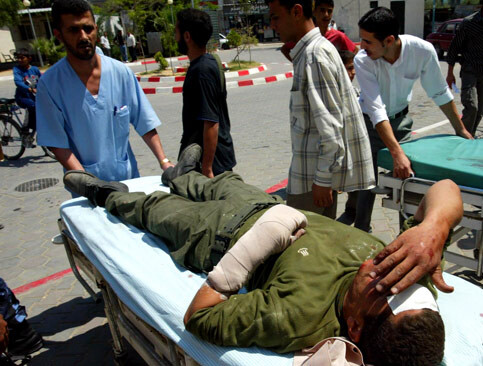Palestinian Center for Human Rights 24 May 2007

Palestinian medics wheel a wounded man to a hospital after he was shot during clashes between Fatah and Hamas militants in Gaza, 15 May 2007. (Hatem Omar/MaanImages)
PCHR strongly condemns the complicated and unjustified Israeli passage procedures at Beit Hanoun (Erez) crossing, which led to the death of a Palestinian who had been granted permission to receive medical treatment at Israeli hospital as he was suffering from serious wounds.
Mohammed Ahmed Ibrahim Mansour, 23, was admitted into Shifa Hospital in Gaza City on 15 May 2007, after he had been wounded by several gunshots during the latest internal fighting in the Gaza Strip. Since he was in a critical condition, his family, in coordination with the liaison officer at the Palestinian Ministry of Health, made efforts over five days to obtain permission for his transfer to Israeli hospitals, but the Israeli side refused to offer him such permission for alleged security reasons.
Following PCHR’s intervention, in coordination with the Israeli Physicians for Human Rights, the Israeli side granted him permission on 21 May 2007 to receive medical treatment at Ekhilov Hospital inside Israel. However, his critical condition forced doctors at Shifa Hospital to prevent his transfer on that day as they believed that his health condition might deteriorate during his transfer.
On 23 May 2007, Mansour’s health condition slightly improved, so the doctors decided that he could be transferred to the Israeli hospital, but fast and carefully. The Israeli side agreed to allow his transfer to Ekhilov Hospital following the intervention of Physicians for Human Rights and PCHR. Mansour was transported in an ambulance from the intensive care unit at Shifa Hospital towards Erez crossing. The ambulance arrived at the crossing at 17:00 as recorded by the Palestinian National Security Forces and the Israeli side was informed about the arrival time. The ambulance had to wait for approximately two hours before the Israeli side allowed it to pass through the crossing. During that time, the ambulance crew made contacts with the liaison officer at the Palestinian Ministry of Health to take necessary steps to ensure the passage of the ambulance. Following the long waiting, Mansour’s health condition deteriorated, so the ambulance crew was forced to transport him back to Shifa Hospital at approximately 19:00. Contacts were made again to ensure his transfer to the Israeli hospital. At approximately 20:00, an ambulance transported him again towards Erez crossing. Even though the passage of the ambulance was coordinated in advance with the Israeli side, the ambulance had to wait for approximately three hours under the pretext of security checking. Mansour was handed to an Israeli ambulance at approximately 23:00. A few minutes later, the Israeli ambulance officer informed his Palestinian counterpart that Mansour died. So, the Palestinian ambulance transported his body to Shifa Hospital in Gaza City.
It is worth noting that Israeli Occupation Forces have continued to close Erez crossing and prohibit free Palestinian movement from the Gaza Strip to Israel or the West Bank. In a few cases, Israeli Occupation Forces allow a few patients and workers of international organizations to pass through the crossing, but under complicated and prolonged security procedures. Additionally, Rafah International Crossing Point on the Egyptian border has been closed, so it has not been possible to transfer Palestinian patients to hospitals in Egypt. The restrictions imposed by Israeli Occupation Forces on the freedom of movement of the Palestinian civilian population constitute a form of collective punishment prohibited by the international law.
In light the above, PCHR is going to submit a complaint to concerned Israeli bodies demanding an investigations into the inhuman passage procedures at Erez crossing, which led to Manour’s death. PCHR also calls for lifting the Israeli restrictions imposed on the movement of patients, as such restrictions violate international human rights instruments.
Related Links